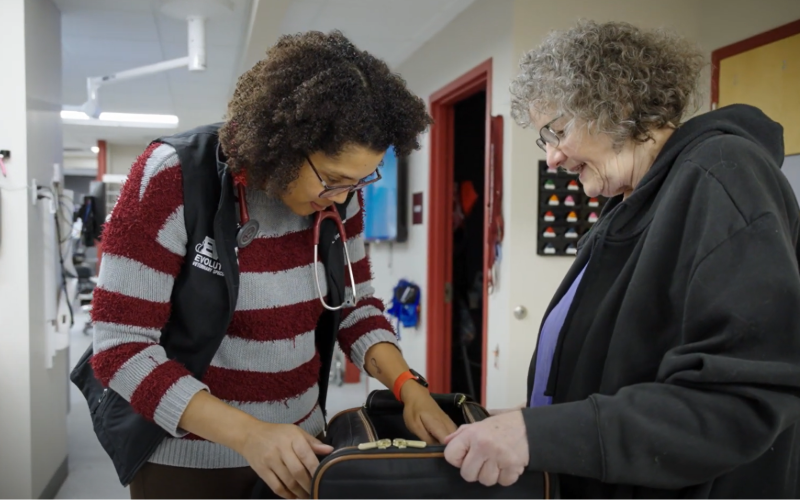Checking Out the Crucial Providers Supplied by a Vet Cardiologist: Understanding Ultrasound and CT Scan Techniques
Veterinary cardiologists play an essential duty in the wellness of pet dogs by identifying and dealing with various heart conditions. They utilize innovative imaging strategies, such as cardiac ultrasound and CT scans, to give precise evaluations. Each approach has its unique advantages and applications. Comprehending these strategies is vital for animal owners looking for the very best take care of their companions. What aspects should family pet proprietors consider when selecting between these analysis tools?

The Role of Veterinary Cardiologists in Pet Dog Healthcare
Vet cardiologists play a crucial duty in the healthcare of animals, concentrating especially on detecting and dealing with heart-related problems. They have specialized training that enables them to translate complicated diagnostic tests and identify various cardio concerns. These specialists use sophisticated methods, such as echocardiography and electrocardiography, to evaluate heart function and structure accurately.Veterinary cardiologists also develop customized therapy plans that may consist of drugs, way of living adjustments, and, in many cases, surgical treatments. Their experience includes enlightening family pet owners about heart health and wellness, highlighting the importance of regular exams and very early detection of potential problems. Cooperation with basic veterinarians is vital, as it guarantees detailed look after animals with believed cardiac issues. By using specialized services, veterinary cardiologists substantially improve the top quality of life for animals and give peace of mind for their proprietors, strengthening the value of heart health in total animal health.
Typical Heart Problems in Pet Dogs
Common heart problems in pets can substantially affect their health and quality of life. Heart whisperings, different kinds of cardiomyopathy, and genetic heart problems are amongst the most prevalent problems that veterinarians encounter. CT Scans For Dogs. Comprehending these concerns is important for family pet owners to ensure prompt diagnosis and proper therapy
Heart Murmurs in Pets
Although heart murmurs can be a resource of problem for animal proprietors, they are not constantly indicative of significant health and wellness issues. A heart whispering is an abnormal noise produced by turbulent blood flow within the heart. In family pets, these whisperings can be caused by various factors, including genetic heart flaws, shutoff concerns, or even stress throughout exams. Numerous pet dogs with heart murmurs lead typical lives without significant health impacts. To identify the underlying reason, vet cardiologists frequently use analysis methods such as echocardiograms and Doppler ultrasounds. Early discovery and analysis are crucial, as they may aid take care of any kind of possible heart issues properly. Pet dog proprietors are urged to consult their vet for a detailed evaluation if a heart whispering is detected.
Cardiomyopathy Kind Explained
Cardiomyopathy incorporates a team of conditions influencing the heart muscle, bring about endangered heart function in pet dogs. One of the most typical types consist of expanded cardiomyopathy (DCM), hypertrophic cardiomyopathy (HCM), and restrictive cardiomyopathy (RCM) DCM largely affects dogs, triggering the heart to enlarge and weaken, which lessens its capacity to pump blood properly. In comparison, HCM is extra widespread in felines, characterized by the thickening of the heart wall surfaces, commonly leading to blocked blood flow. RCM, though less common, takes place when the heart muscle mass becomes rigid, restricting its capacity to fill up with blood. Each kind provides special obstacles in diagnosis and treatment, demanding specialized veterinary cardiological analysis to assure peak monitoring and treatment for impacted pets.
Genetic Heart Problems
Genetic heart flaws represent a substantial group of cardiac concerns in animals, distinct from obtained problems such as cardiomyopathy - Cancer Veterinary Near Me. These flaws are structural abnormalities present at birth, impacting the heart's normal feature. Common kinds include license ductus arteriosus, ventricular septal flaws, and pulmonic stenosis. Signs and symptoms may differ widely, varying from mild to serious, and can consist of exercise intolerance, coughing, and difficulty breathing. Early medical diagnosis with innovative imaging techniques like ultrasound is important for effective administration. Vet cardiologists play a vital duty in determining these conditions and advising appropriate therapy options, which may consist of clinical administration or medical intervention. Identifying hereditary heart defects enables for much better results and boosted high quality of life for impacted pet dogs
Comprehending Heart Ultrasound: Just How It Works
A significant number of veterinary practices now make use of heart ultrasound as a crucial analysis device for evaluating heart health and wellness in pets. This non-invasive technique uses high-frequency sound waves to create photos of the heart's framework and function. During the procedure, a vet service technician applies a gel to the pet's upper body and makes use of a transducer to emit ultrasound waves. These waves jump off the heart and bordering frameworks, creating real-time images on a monitor.Veterinarians can evaluate various aspects of cardiac health, including chamber size, wall movement, and shutoff feature. In addition, cardiac ultrasound permits the discovery of problems such as liquid accumulation and congenital heart problems. This method is important for diagnosing problems that might not be noticeable with conventional radiographs. By offering in-depth info about the heart's makeup and performance, cardiac ultrasound aids in developing effective therapy prepare for pets dealing with cardiovascular disease.
The Importance of CT Checks in Identifying Heart Conditions
Exactly how do CT scans enhance the medical diagnosis of heart conditions in vet medication? CT scans give thorough cross-sectional pictures of the heart and surrounding structures, allowing vets to imagine complex anatomical relationships. This imaging technique is especially advantageous in identifying hereditary heart problems, heart tumors, and problems in blood vessels. By making use of sophisticated imaging formulas, CT scans can evaluate heart chamber dimensions and function, offering a detailed view that might be challenging to achieve with typical methods.Additionally, CT angiography can imagine blood circulation and identify areas of stenosis or obstruction, which is crucial for intending prospective interventions. The rate and precision of CT scans also assist in fast diagnoses, crucial in emergency scenarios. Eventually, the incorporation of CT checks into veterinary cardiology substantially enhances the accuracy of medical diagnoses, enabling targeted treatment plans and boosting client outcomes for animals struggling with heart disease.
Contrasting Ultrasound and CT Check Techniques
While both ultrasound and CT scans are vital tools in vet cardiology, they provide distinctive benefits and constraints that influence their use in diagnosing heart disease. Ultrasound, or echocardiography, provides real-time imaging of the heart's framework and feature, allowing veterinarians to analyze heart chambers, valves, and blood flow. It is particularly effective for assessing problems like congestive heart failing and cardiomyopathy. Ultrasound may be limited in imagining particular anatomical frameworks due to person size or obesity.In contrast, CT scans offer in-depth cross-sectional pictures of the heart and bordering tissues, making them perfect for identifying structural irregularities, growths, or vascular concerns. Although CT scans offer complete Board Certified Veterinary Cardiologist understandings, they need sedation and may include radiation direct exposure. Inevitably, the choice in between ultrasound and CT scans depends on the certain professional circumstance, the person's condition, and the information needed for an exact diagnosis.
Treatment Choices Available Through Veterinary Cardiology
Veterinary cardiology supplies a variety of therapy alternatives customized to resolve different heart conditions in pets. Treatment strategies commonly begin with lifestyle adjustments, including diet regimen modifications and exercise changes, aimed at boosting general heart health. Drugs play an essential duty, with cardiologists recommending medications such as diuretics, beta-blockers, and ACE preventions to enhance and handle symptoms heart function.In much more extreme situations, interventional treatments, such as balloon valvuloplasty or stent placement, might be necessary to alleviate obstructions or boost blood flow. For sure hereditary heart issues, surgical choices might be explored to fix architectural concerns. Additionally, continuous monitoring and follow-up care are necessary elements of a detailed therapy strategy, enabling timely changes based on the pet's feedback to therapy. On the whole, veterinary cardiology concentrates on giving effective, individualized like optimize the health and wellness and health of pet clients with heart conditions.
Exactly how to Prepare Your Family Pet for a Heart Analysis
Preparing a family pet for a cardiac assessment is important to guarantee precise this contact form outcomes and a smooth procedure. Proprietors ought to first set up the visit with the vet cardiologist and go over any particular demands or worries. It is suggested to hold back food for at least 12 hours prior to the analysis, as this helps boost imaging quality during procedures like ultrasound or CT scans.Additionally, maintaining a calm environment on the day of the appointment can help in reducing the animal's anxiety. It is beneficial to bring along any kind of pertinent medical documents, including previous tests and medications (CT Scans For Animals). Proprietors must also ensure that their pet dog is comfy and leashed throughout transport to the center. Lastly, familiarizing themselves with the assessment process can help and minimize fears in asking informed concerns throughout the examination. By adhering to these actions, owners can contribute substantially to the performance of the heart analysis
Regularly Asked Inquiries
The length of time Does a Heart Ultrasound or CT Check Take?
The period of a heart ultrasound commonly varies from 30 to 60 mins, while a CT check might take about 15 to half an hour. Variables such as the individual's condition can affect these time quotes.

Exist Any Kind Of Dangers Connected With These Diagnostic Treatments?

Can I Stick With My Family Pet Throughout the Procedure?
The veterinary center's plan usually dictates whether family pet owners can stay throughout treatments. While some facilities encourage owner presence for comfort, others may call for separation to assure safety and security and perfect conditions for diagnostic imaging.
Just how much Do These Diagnostic Examinations Commonly Price?
The costs of analysis tests, such as ultrasound and CT scans, generally differ based on place and facility. Generally, prices range from a few hundred to over a thousand bucks, mirroring the intricacy and innovation involved.
What Is the Recovery Refine After a Cardiac Analysis?
The healing procedure after a cardiac analysis includes monitoring the family pet for any type of instant reactions, guaranteeing convenience, and limiting exercise. Veterinarians normally provide post-evaluation he has a good point guidelines to guide family pet owners throughout this necessary healing period. Heart whisperings, various types of cardiomyopathy, and congenital heart defects are amongst the most common problems that veterinarians experience. A heart whispering is an unusual audio created by rough blood circulation within the heart. Cardiomyopathy incorporates a group of diseases impacting the heart muscular tissue, leading to compromised heart function in pets. Genetic heart flaws represent a substantial classification of heart concerns in animals, unique from acquired conditions such as cardiomyopathy. Ultrasound, or echocardiography, supplies real-time imaging of the heart's framework and function, enabling vets to assess heart chambers, valves, and blood circulation.